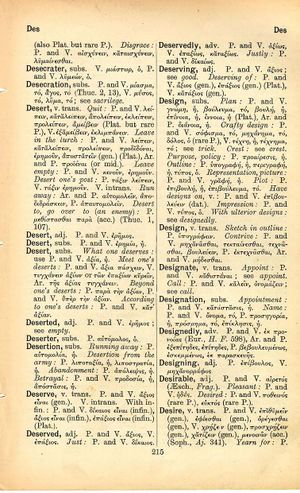desire
Καλὸν τὸ θνῄσκειν, οἷς ὕβριν τὸ ζῆν φέρει → Quis foeda vita restat, his pulchrum est mori → Wem das Leben Schmach bringt, dem ist Sterben schön
English > Greek (Woodhouse)
verb transitive
P. and V. ἐπιθυμεῖν (gen.), ἐφίεσθαι (gen.), ὀρέγεσθαι (gen.), V. χρῄζειν (gen.), προσχρῄζειν (gen.), χατίζειν (gen.), μενοινᾶν (acc.) (Soph., Ajax 341).
yearn for: P. and V. ποθεῖν (acc.), Ar. and V. ἱμείρειν (gcn.), V. ἱμείρεσθαι (gen.).
be enamoured of: P. and V. ἐρᾶν (gen.), Ar. and V. ἔρασθαι (gen.).
desire ardently: P. γλίχεσθαι (gen.).
verb intransitive Also with infin.: P. and V. ἐπιθυμεῖν, ἐφίεσθαι, βούλεσθαι, ὀρέγεσθαι, Ar. and P. ἐθέλειν, V. ἱμείρειν, ἱμείρεσθαι, ποθεῖν, ἐρᾶν, ἔρασθαι, προσχρῄζειν, Ar. and V. μενοινᾶν (Eur., Cyclops 448), θέλειν, χρῄζειν (rare P.).
desire ardently (with infin.): P. γλίχεσθαι.
seek (with infin.): P. and V. ζητεῖν.
substantive
love: P. and V. ἔρως, ὁ, πόθος, ὁ (Plato but rare P.), ἵμερος, ὁ (Plato but rare P.).
desire of: P. and V. ἐπιθυμία, ἡ (gen.), ἔρως, ὁ (rare P.) (gen.). πόθος, ὁ (rare P.) (gen.).

